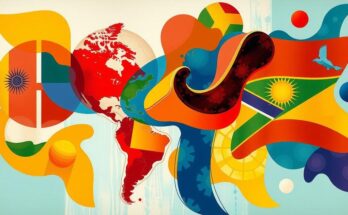African leaders convened in Windhoek for the funeral of Sam Nujoma, Namibia’s ‘founding father.’ Dignitaries such as Presidents Cyril Ramaphosa and Thabo Mbeki paid tribute to Nujoma’s role in ending colonialism. He served as Namibia’s first president from 1990 to 2005, despite facing criticism for his governance style and media censorship. Nujoma was buried at Heroes’ Acre, a memorial for liberation fighters.
On Saturday, leaders from across Africa gathered in Windhoek, Namibia, for the funeral of Sam Nujoma, revered as the nation’s ‘founding father.’ Nujoma, who played a pivotal role in opposing colonialism and South African military occupation, passed away at the age of 95. Among the dignitaries in attendance were South African President Cyril Ramaphosa and former Presidents Thabo Mbeki and Jakaya Kikwete, marking a significant moment in honoring Namibia’s independence hero.
During the ceremony, President Nangolo Mbumba reflected on Nujoma’s legacy, stating, “We fought under your command, … won the liberation struggle, and forever removed apartheid colonialism from the face of Namibia.” Nujoma’s coffin was adorned with the national flag of Namibia and was interred at Heroes’ Acre, a memorial dedicated to those who fought for the country’s liberation from colonial oppression.
Nujoma served as Namibia’s first president from 1990 until 2005, portraying himself as a unifying figure amidst political division. Nevertheless, he faced criticism for his treatment of the media, particularly his harsh stance towards dissenting voices and his controversial positions on homosexuality. Additionally, he invoked debate with a 1998 constitutional amendment that enabled him to seek a third presidential term, raising concerns about democratic governance in the country.
The funeral of Sam Nujoma marked a significant tribute to a leader who played an instrumental role in Namibia’s struggle for independence. While his leadership was characterized by significant achievements in unifying the country, it was not without its controversies, particularly regarding civil liberties and governance. The gathering of African leaders in his honor underscores his impactful legacy in both Namibia and the broader African continent.
Original Source: www.usnews.com




